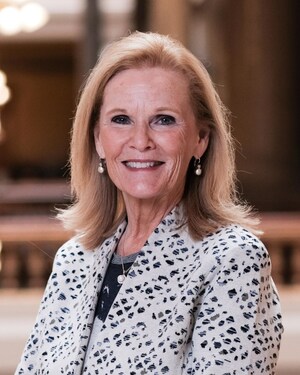Lumina Quality Credentials Task Force Unveils New Approach to Assure Quality of Post‒High School Learning
A new report, Unlocking the Nation's Potential, calls for collaboration across sectors to ensure equitable access to quality programs
INDIANAPOLIS, Sept. 10, 2019 /PRNewswire/ -- Lumina Foundation and 22 education, policy, and workforce leaders today released a report calling for a coordinated national response to defining and assuring the quality of postsecondary programs while eliminating inequities in access to programs that lead to earning quality credentials. In Unlocking the Nation's Potential: A Model to Advance Quality and Equity in Education Beyond High School, Lumina's Quality Credentials Task Force proposes an approach that seeks to establish a shared understanding of what a quality credential is—as well as what it takes to develop, offer, and identify one.
According to the task force, current systems of learning after high school lack a comprehensive definition of quality and an up-to-date set of indicators that can be used to develop new regulations and to drive needed improvements in policies and practices. Lumina defines quality credentials as degrees, certificates, industry certifications, or other credentials that—at a minimum—have clear and transparent learning outcomes and that lead to meaningful employment and to further learning.
The model in the report begins with the broad array of individual and societal outcomes that result from a system focused on questions of quality, including how students can advance their education and careers and contribute to the broader economy and civic community. The model connects these outcomes back to thoughtful program design and the student-centered practices within institutions necessary to produce those outcomes.
"As today's post-high school landscape has evolved alongside technological innovation, challenges to democratic institutions, and increasingly globalized work and learning communities, our systems for quality assurance have continued to rely on outdated assumptions, leaving some student groups vulnerable to wasting time and money on ineffective educational pathways," said Debra Humphreys, Lumina's vice president of strategic engagement and the task force's co-chair. "We need a system that defines quality based on evidence that credentials prepare students with relevant skills for the job market and give them the knowledge, skills, and abilities to pursue additional learning and lead fulfilling lives as workers, citizens, and community members."
In Unlocking the Nation's Potential, the task force states that for decades inequities have persisted among certain groups of students. Students from black, Latino, and American Indian communities, in particular, earn credentials at far lower rates than more privileged students. These students also too often miss opportunities to benefit from the highest-quality educational programs and practices.
The task force emphasizes that reform is needed at all levels to ensure every student has access to equitable programs. The panel offered three recommendations for actors in the space, such as college and university leaders, state and federal policymakers, accreditors, and faculty members:
- Commit to pursuing quality and equity, not as discrete goals, but as a dual, linked objective
- Coordinate the pursuit of curricular reform led by faculty and academic leaders along with regulatory reforms developed by federal and state policymakers, accreditors, and associations
- Enlist and support the active cooperation of leaders from all these relevant sectors
"As today's students navigate the complex world of higher education, it is imperative that a quality framework is in place to protect them and address inequities within higher education," said Julie Peller, executive director of Higher Learning Advocates and task force member. "This framework not only addresses these minimum expectations, it also thoughtfully considers ways to ensure the system evolves to better serve the multiple pathways and demographics of today's students."
Lumina and the task force intend that Unlocking the Nation's Potential and this proposed new approach will initiate a national dialogue and serve as a starting point for ongoing collaboration among leaders across the education, policy, and workforce sectors. These leaders are best positioned to change education policy and practice to better serve today's students and prepare them to take advantage of new opportunities.
"To realize our shared vision of a model of quality and, ultimately, a more equitable higher learning system will require commitment and collaboration from many individuals and institutions," said Michelle Cooper, president of the Institute for Higher Education Policy and member of the task force. "No single actor or sector can design, build, implement, and maintain the student-centered quality assurance system we believe is necessary and long overdue. We must all work together—and urgently—because all students deserve access to high-quality educational programs that lead to meaningful opportunity."
To read the full report and explore more findings from the task force, visit https://www.luminafoundation.org/files/resources/unlocking-the-nations-potential.pdf
About Lumina Foundation: Lumina Foundation is an independent, private foundation in Indianapolis that is committed to making opportunities for learning beyond high school available to all. Lumina envisions a system that is easy to navigate, delivers fair results, and meets the nation's need for talent through a broad range of credentials. The foundation's goal is to prepare people for informed citizenship and for success in a global economy.
Media contact:
Tracy Chen
Director of Media Strategy, Lumina Foundation
[email protected]
(317) 670-0521
SOURCE Lumina Foundation

WANT YOUR COMPANY'S NEWS FEATURED ON PRNEWSWIRE.COM?
Newsrooms &
Influencers
Digital Media
Outlets
Journalists
Opted In



Share this article